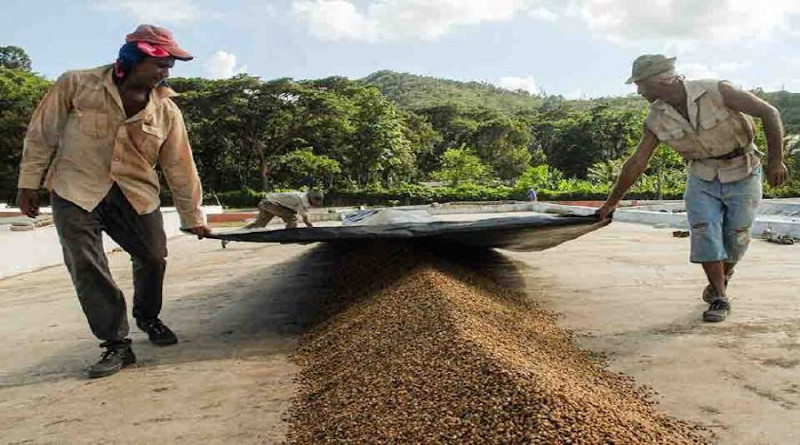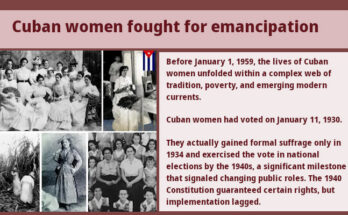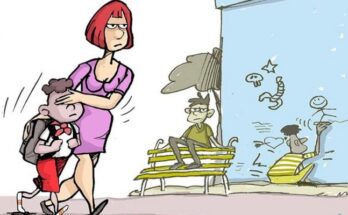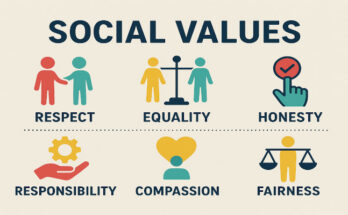To turn the exceptions into the rule, to generalize the experiences that show that things can be done, to systematize them and put science into them, in order to achieve the expected progress by 2023, was the call of Miguel Díaz-Canel Bermúdez, First Secretary of the Central Committee of the Communist Party of Cuba (PCC) and President of the Republic, at the working meeting that assessed the current year’s projections in Guantánamo.
In the exchange, the president specified that, in order to achieve success, greater political assurance is required from the PCC, by leading the processes, popular participation in the control and implementation of each resolutive action, and adequate governance to coordinate, to assess and to rectify all the transforming tasks promoted.
“A different year requires different solutions,” said Prime Minister Manuel Marrero Cruz, who accompanied Díaz-Canel in the meeting, the tenth in the country, where there were also Political Bureau member Roberto Morales Ojeda, Secretary of Organization of the CCP Central Committee; Rafael Pérez Fernández, First Secretary of the Party in the province, and Emilio Mosqueda Matos, local governor, along with officials, directors and producers.
Marrero Cruz acknowledged that the province is advancing in several ways, with good experiences in food production, exports… however, it continues to be loss-making, with 28 companies with losses. Another issue to be addressed in 2023 is that of high prices, and thought must be given to this issue, he said.
“The key is to appeal to that collective intelligence, to enhance government structures, to increase production, since 49% of Guantanamo’s workers are from the budgeted sector. We must stop improvising and see science not as an option but as an efficient and effective method to overcome our deficiencies”, added the political leader.
Precisely along these lines, the rector of the University of Guantánamo, PhD Osiris Aranda Creagh, called for a better use of the human resources coming from the University of Guantánamo. “We have dozens of PhDs, more than three thousands masters and specialists, we graduate some 300 students with gold degrees, and where are the results of their research, in the social, cultural, economic, or productive sphere?”
Morales Ojeda highlighted the potentiality that means having so much talent, something unthinkable years ago, and that now it is up to the government structures, state enterprises and entities to make use of those graduates, and to project programs that allow, for example, to reduce more than 50% of food imports, which is very costly to the country at present.
The member of the Political Bureau remarked the urgent need to act in favor of the welfare and quality of life of the people, and to eliminate everything that attempts against it: inflation, shortages, poor quality of services, currency devaluation, corruption and illegalities.
It is up to the Party to guide these changes effectively, warned the Secretary of Organization of the Central Committee. From the militancy as vanguard should be born the initiatives to promote the use of agro-ecology, generate new sources of employment, produce more sugar, activate the state enterprise, make a rational use of resources, improve communication and computerize the processes, and motivate the youth to make their own the economic and ideological battles for socialism.
He also stressed, as a pending issue, the unity of action in social networks, since the activism of cadres and militants in that environment is still very poor, in which Cuba is fighting an unequal battle against disinformation and the blockade, and in favor of the Revolution.
“This 2023 will be different,” assured the First Secretary of the PCC in Guantanamo. In 2022 it was possible to increase exports, with 2,600 tons of coffee, cocoa, coal and elver, 25 new items are being studied, new productive poles were consolidated with hydraulic investments and the mercantile circulation was fulfilled.
In addition, he added, medical offices were improved, housing was delivered to vulnerable families, communities were transformed, 46 mini-industries of construction materials were created, 32 local development projects were completed, new actors are incorporated into the economy and more can be done.
Arístides Creagh Leonard, director of the Cuban Fund for Cultural Goods (FCBC) branch in Guantánamo, explained how his entity, through linkages with local and other provinces’ MSMEs, as well as the territory’s creators, marketed to the people more than 10,000 assortments at affordable prices in local currency.
“Likewise, we made agreements with the Directorate of Commerce to sell textiles and footwear in the network of retail stores in different localities, including boots for the peasantry, and in the tourism sector we supported the refurbishment of hotels in Guardalavaca and Ramón de Antilla, Holguín’s pole,” Creagh added.
Jorge Fernandez, a producer from Guantanamo, told the meeting that he expects a lot of fruits from the 100 hectares of plantain planted in El Salvador. He also intercropped cabbage, thus diversifying production and contributing to local self-sufficiency.
Albernis Veranes Fabier, provincial delegate of Agriculture, referring to food production, a fundamental challenge today, revealed that the claim of the sector is to deliver 33 pounds per capita of food (between viands, vegetables, vegetables and fruits). This will require a more efficient use of land and an increase in irrigated areas, both priorities for this year.
“We managed to correct the non-payments to producers and we have already planted the 5,300 hectares of coconut planned in the recovery program, and we even want to reach 7,000 hectares of coconut, which is vital for export. This shows that it is possible, with science, awareness and commitment, but above all when we work together for the same purpose,” said Veranes Fabier.
“LET’S GET TO WORK, SANTIAGO”.
With that precise message, the First Secretary summarized the exchange held with political, governmental, social, business authorities and other economic actors of Santiago de Cuba, about the strategy implemented in the province in view of the current socio-economic and political-ideological situations.
Morales Ojeda urged to think about what to do to provide more and better quality services in all senses, among other challenges.
Regarding the potentialities of the territory, José Ramón Monteagudo Ruiz, first secretary of the PCC in the territory, exposed, through a report, the existence of productive poles and idle lands that require effective exploitation, the implementation of 41 local development projects, and the presence of an important network of scientific centers.
He also pointed out that the cold planting campaign exceeds 70,000 hectares for viands, grains, vegetables and fruit trees, while the spring campaign includes 60,000 hectares of various crops, while actions are also defined in the production of meat, milk, eggs, freshwater fish, along with the chaining for the process in the industry.
In the same sense, there are reservations in other directions, but with a critical approach, he acknowledged that there is still a long way to go to achieve the desired impact of the 43 measures aimed at energizing the business system, of the 63 with the same purpose in the food sector, and of the 93 aimed at saving the sugar agro-industry, as well as the existence of 30 companies with losses, and the persistence of abusive prices.
A clear example of the capacity to revert such situations was shown by Víctor Manuel Montesino, director of the Swine Genetic Company El Alcázar, in the municipality of Contramaestre, which has diversified its corporate purpose with the production of large and small livestock, milk, poultry, eggs and various crops.
According to him, the socialist state enterprise can be efficient, and he added that, with part of the year’s profits, they set up a mechanical milking system for the cows, and installed another one for goats on a pallet. In addition, they added 300 neighboring hectares that had remained idle, started the production of charcoal from marabú, and increased the number of direct workers in production by 40.
In recognizing the results, Díaz-Canel said that these meetings allow to appreciate those positive concepts that go from the diversification of the company’s purpose, to the fact that the state company cannot be only a service company, but it has to produce efficiently, and also the possibility of expanding direct structures in production.
In response to Marrero Cruz’s interest, Víctor Manuel explained that the first thing is the link with the force and the commitment with the people, since they have also taken responsibility for ensuring the milk for Coppelia santiaguero’s ice cream, and the delivery of quail eggs for the food company’s sweets.
Another productive turnaround was reported by Silva Portales, director of the Laguna Blanca Integral Agricultural Enterprise, according to which there, from 10,000 hectares, they have grown to 3,600, a strong link has been established with scientific centers in Villa Clara, Granma and Santiago de Cuba to obtain seeds and agroecological productions, while, from 308 indirect workers, they only kept 46.
From that entity of Contramaestre, the usufructuary Yordan Alvarez explained that, in response to the direction of the province, he planted eight hectares of tomato that, without technological package, have contributed each one, based on organic matter and biological means, 12 tons, all destined to the city of Santiago de Cuba, and at a price never higher than 35 pesos per pound,
In Santiago, not everything has been solved,” reflected the Head of State, “we need to produce much more food, but this is an example that must be expanded, multiplied and consolidated, because with the effort and commitment of this young man, tomato production in the province is solved, and with genetic centers like El Alcazar, meat production is solved”.
Through other interventions, the results of the Experimental Station of Coffee in the municipality of Tercer Frente, to increase the crop yields, the 18 local development projects in the municipality of Santiago de Cuba, and the experience of the Party’s work in Palma Soriano, presented by the first secretary in that municipality, Annia Poblador Serguera.
Marrero Cruz focused on the municipality’s responsibility to produce the food that corresponds to its population, as well as to the functioning of its board of directors, the satisfaction of problems such as raising the capacities of children’s circles, solving the collection of fines and taxes, and strengthening the work in the neighborhoods.
Morales Ojeda reiterated that the Second National Conference of the Party will be held in October, and urged that, together with the motivations of the 170th anniversary of the birth of José Martí, the 65th anniversary of the Third and Second Fronts, the 145th anniversary of the Baraguá Protest, the 70th anniversary of the Moncada and the 65th anniversary of the Revolution, Santiago can show how far it has advanced, with the dedication and unity of its people.

MULTIPLYING THE BEST EXPERIENCES
The certainty that it is possible to bet on economic and social growth in the territories from the best use of human capital, national alternatives and innovative experiences, focused the meeting with the country’s top leadership in Granma.
“We know that we are in a complicated moment, but we are going to move forward with our own talents and with the multiplication of the best experiences,” said Diaz-Canel, after listening to several speeches of businessmen, managers and producers from Granma, who today “jump” the walls of the blockade with measures and concrete actions that generate income and contributions to the development of the province.
In this sense, he insisted on the importance of promoting the diversification process in state enterprises through the efficient use of the powers granted to them, while he pointed out the need to introduce more rigorously the use of agro-ecology in food production, and the urgency of speeding up the mechanisms for the delivery of land in usufruct.
He also said that it is a social responsibility of state-owned companies to take care of their workers and get involved in the development of the communities where they are located.
Here we have listened to managers and producers with work results that show that this aspiration is possible; that is why we are defending this strategy as a way to promote the local development of the municipalities and improve the quality of life of the people, the President said.
However, he clarified that on this path it will also be necessary to consolidate other decisive programs for the province and the country, both in the economic and social spheres.
In the exchange, in which Marrero Cruz and Morales Ojeda also participated, it was ratified that, although the hostile policy of the US government towards Cuba and its restrictive measures continue to be the main obstacle to our development, it is urgent to give a creative response in all spheres of national life.
In this regard, Morales Ojeda exposed that a deep review of the economic situation in recent times must be carried out in all territories, to better understand the need to change the ways of doing.
“We have a great challenge and commitment with the people: to progressively eliminate everything that prevents the improvement of welfare and quality of life”, he pointed out.
In view of this reality, he pointed out that we must ask ourselves how we are going to produce more food; what are we going to do to provide more quality services in health, gastronomy, education and other vital sectors; how are we going to manage to shake the socialist state enterprise; to what extent can we promote the construction and repair of houses from the local production of materials; or in what way are we going to generalize the best productive experiences, and increase exports and substitute imports.
“The answers to these questions are what the people need”, emphasized Morales Ojeda.
TO GROW ABOVE THE DIFFICULTIES
When submitting the work projections for this year 2023, the member of the Central Committee and first secretary of the Party in Granma, Yanaisi Capó Nápoles, highlighted the existence in the province of some 430 productive bases with sufficient potentialities to boost the growth of agricultural productions, based on a better use of the areas and local alternatives.
In an eminently agricultural territory, she affirmed, it is necessary to continue promoting, without delay, the rice program, the development of aquaculture and beekeeping production, in addition to increasing the volumes of sowing and harvesting of coffee, tobacco, various crops and other items, because food production cannot continue to depend on the millionaire imports that the country spends annually for this concept.
The leader was also emphatic when explaining that in Granma are located several national industries with productive capacities that can still be exploited in a more efficient way, such as the Bayamo Mechanical Company, Accumulators, Teaching Media and Texoro, among others.
The Fernando Echenique Agroindustrial Grain Enterprise -the largest rice producer in Cuba-, which received the concession of faculties for foreign trade; and the Oral Liquid Medicines Enterprise, Medilip, whose laboratories have obtained new lines of extracts and natural products, also lead the development of the province, which now has among its challenges to recover sugarcane production, oxygenate the housing program and grow in the production of goods and services.
Marrero Cruz said that, despite having faced very hard previous years, 2023 has to be a different calendar based on the search for variants that turn many of the problems affecting the population into solutions.
We have to make the governing bodies work in each of their structures and improve the work systems with fewer meetings and more exchanges at the base, in the furrow and in the companies where there are difficulties.
“We want to advance in the consolidation of the economic actors, but that purpose has to be accompanied by the growth of the socialist state enterprise as the main productive entity of the country,” he stressed.
Also this year we have to advance more in the solution of social problems, in the control of crime and illegalities, and in the conception of strategies to stop the galloping inflation that affects the people so much, he concluded.
(Taken from Granma in Spanish)




